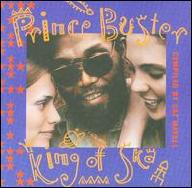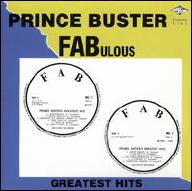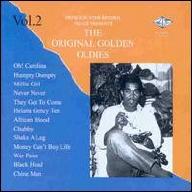Cecil Bustamente Campbell was born on the island of Jamaica on May 28, 1938, the son of a railway worker. While still in his teens, Campbell simultaneously pursued two quite separate careers -- boxing and singing. Eventually, he'd give up the former, a talent he honed as a child leading a gang in one of Kingston's toughest neighborhoods, although it would hold him in good stead once he opened his sound system. He made his singing debut at the Glass Bucket club in the mid-'50s and fronted a number of now long-forgotten groups. Several of them included drummer Arkland Drumbago Parkes in their lineups and the two became friends. The drummer provided the introduction to Coxsone Dodd, not yet a producer, but at the time running a hot sound system in competition with another businessman soon to turn producer, Duke Reid. Dodd employed the young singer not for his vocals, but for his fists, as a security guard cum Guy Friday. By 1959, the young Buster understood the sound system business inside and out and set off on his own. He began by opening a record store, Buster's Record Shack, and then set up the Voice of the People sound system.
The following year, the young entrepreneur took the next logical step and produced his debut single, the instrumental "Little Honey," credited to Buster's Group (a trio of Jah Jerry, Rico Rodriguez, and Parkes). It immediately created a sensation, with a sound far removed from the American R&B swamping the sound systems. Prince Buster had basically introduced the classic syncopated rhythm of ska to a voracious Jamaican nation. A second recording session was arranged, this time including vocalists Derrick Morgan, Owen Gray, and the Folkes Brothers, while nyahbinghi drummers Count Ossie His Wareikas were brought in from the hills to create a rhythm never experienced before by most Jamaican audiences. A baker's dozen of songs were recorded and amazingly, every one became a hit, kicking off with the Folkes Brothers' seminal hit "Oh Carolina." And the smashes just kept on coming, with these artists and more, including Basil Gabbidon, the boogie "War Paint Baby"; Eric Morris, "Humpty Dumpty"; and Chuck Dobby. All were backed by Buster's Group an aggregation of excellent musicians that included various Skatalites-to-be. Particularly revolutionary was Bunny Skitter's "Chubby," a startling single that featured the duo a cappella, accompanied by Count Ossie His Wareikas tribal beats. Not surprisingly, the single wasn't a success as audiences preferred the more commercial sound of "Oh Carolina." But both songs were breaking new ground and kicked off a wave of releases employing nyahbinghi-style rhythms.
Prince Buster himself made his recording debut in 1962, releasing a clutch of hits over the year. Among these was "Hey Got to Go," co-written by the teenaged Derrick Morgan, whose lyrics pointedly summed up Prince Buster's feelings toward his rival producers. This business feud, which the elder men were still winning thanks to their better financial resources, became personal in 1963 when Derrick Morgan deserted Buster for producer Leslie Kong. In truth, it wasn't quite that simple, as the young singer had made his debut with "Lover Boy" for Reid and had remained loyal to him until the producer took a brief hiatus from the music business. Reid had burned him, however, by recording but often not releasing the teen's songs. Needless to say, the youngster was now determined to record for whomever offered him the most work and money. And at the moment, that was Kong. However, adding insult to perceived injury was Morgan's second cut for his new master, "Housewife's Choice," which apparently featured an instrumental break stolen from one of his former employer's own songs. Prince Buster's fury could barely be contained. It all seems a tempest in a teapot today, but the upshot was serious, even though it did create a host of seminal singles. Prince Buster fired the first salvo with "Blackhead Chinaman," a stinging riposte aimed directly at Kong. Of course, the producer had to retaliate, shooting back with Morgan's "Blazing Fire," which ripped off the melody to Buster's own smash hit "Madness."
To muddy the waters, "Madness" itself had borrowed the rhythm from "They Got to Go." Weeks turned to months, and the feud showed no signs of ebbing as the two men took aim and fired off song after insulting song at each other, each one a classic of wit and music. Unfortunately, the fight was not contained to the studio, but soon spilled over into the sound system parties and streets, as each side's supporters slugged it out on the dancefloors and the streets. The situation had become so serious that the government finally stepped in and a public reconciliation finally put an end to this musical melee. By this time, Prince Buster, as artist and producer, was already releasing so many singles that he set up two new imprints (Islam and Buster Wild Bells) to help with the overflow from his original Voice of the People label. Blue Beat, his U.K. distributor, could barely keep up with the output, and over an eight-year period he released over 600 Prince Buster productions. This works out to approximately two new singles a week produced by Buster, with two new singles of the artist's own hitting the British streets every month. A superstar in Jamaica, he was almost as big in the U.K. Hit after classic hit, a flood of seminal singles was fed into the market, many of which were rounded up on Blue Beat's I Feel the Spirit in 1963.
The year 1964 was just as prolific, as was 1965, and included such classics as "One Step Beyond," "Al Capone" (which broke the Top 20 in the U.K. two years later), "Burke's Law (arguably the blueprint for Eek-A-Mouse's distinctive vocal style), and many, many more. Blue Beat released three compilation albums of Prince Buster productions across 1964-1965. This trio of Fly Flying Ska, Pain in My Belly (the title track is a Maytals' classic), and It's Burke's Law remain the definitive collection of Buster's work during this period. Among the classics included are Don Drummond's "Ska Town," Owen Gray's "River Jordan," the Maytals' smoking "Dog War," and of course, "Al Capone."
In 1966, ska slowed into rocksteady and Jamaica was abuzz about the rise of the rude boys. This was the era of the classic vocal groups, but Prince Buster, always a man of the people, had his finger on the rudies' pulse. The tough "Hard Man Fe Dead," the classic "Rude Rude Rudie," and the ferocious "Shanty-Town" were just some of the masterpieces he released during this period. The following year, Derrick Morgan released the seminal "Tougher Than Tough" single, wherein a quartet of rude boys is hauled before his unnamed judge for sentencing. Although charged with violent crimes including "gun-shooting," Morgan's lenient magistrate lets these miscreants off. The single was a phenomenal success, so of course Prince Buster would have to respond. He did with ferocity on "Judge Dread," and in a total and absolutely unexpected turnabout, sentenced the hapless rudies appearing before him to centuries in jail. Uproar followed, not on record but in real life, as the entire nation was caught up by the trial. Other artists now jumped on the Judge's bandwagon, and a slew of singles featuring singing magistrates and defendants followed.
Eventually, Buster was ready to step back into the courtroom fray and the island avidly awaited the result of "The Barrister," a single cleverly credited to the Appeal. The verdict actually made the Jamaican national news and no wonder, Judge Dread had jailed the appealing barrister. More outrage, more singles, and Prince Buster finally gave in and released his final word on the subject, "Judge Dread Dance (The Pardon)." Except it wasn't the final word: Morgan still had one last case to hear and on "Judge Dread in Court," he jailed the notorious magistrate for impersonating a judge.
All of these songs appeared on Blue Beat's Judge Dread Rock Steady, which included other Buster singles from this time, including the moody hit "Ghost Dance." He's rough, he's tough, and now Judge Dread's in jail for a million years. This judicial soap opera may seem ludicrous today, but at the time it addressed the serious problem of youth violence that threatened the island, albeit with dollops of humor. However, between Morgan's pushover magistrate and Buster's draconian Dread, it opened the door for serious discussion of the island's rising tide of violent young offenders. Lee Perry's barrister on "Set Them Free," for example, poignantly explains the societal causes that led his defendants to court.
Meanwhile, the U.K. was in the grips of gangster fever as the two-year-old Jamaican hit "Al Capone" was now shooting its way up the U.K. chart, prompting a U.K. tour. This was captured on the On Tour album, where Buster performed a fabulous hits-laden set before an exuberant audience. Back in Jamaica, rocksteady was drawing to a close, reggae was on the rise, and Prince Buster had a new furor to invoke. Across 1968, he released a clutch of seminal singles ensured to raise blushes from all but the least bashful. These rude classics include the likes of "Wreck a Pum Pum," "Big Five," "Rough Rider" (written for Buster by young English pop star Eddy Grant), and "Wine & Grind" (the last two both later covered by 2-Tone heroes the Beat). The Fab label features a clutch of Buster's rude offerings on 1968's Wreck a Pum Pum and the following year's She Was a Rough Rider, while Melodisc managed to fill an entire album with them for 1972's Big Five. "Big Five," itself, was responsible for the launch of English DJ Alex Hughes to superstardom. Renaming himself Judge Dread, he carried on the "Big" saga into the realms of improbability that finally ended with "Big Twelve." The Judge was the first British reggae artist to score in Jamaica, where his fans were quite astonished and bemused to discover that their hero was actually an overweight white man.
While Judge Dread was notching up the hits, Prince Buster was already turning his attention elsewhere. Of course, rude reggae was only a fraction of what he released during the late '60s and early '70s; there was also a clutch of Beatles covers, and numerous songs dealing with other subjects entirely, and he even addressed Rastafarianism by the turn of the decade. But it was this latter area that was about to turn into a minefield. Dodd and Reid were in a similar boat, but Prince Buster was even less equipped to cope with the rise of roots than his competitors. They were merely businessmen, while Buster had converted to Islam in 1961 and thus could not credibly sing about Rastafarianism; this religious movement was at the heart and soul of roots. Prince Buster tried his hand at DJ productions instead, finding success with both Dennis Alcapone and Big Youth. But the genre didn't really seem to suit him. He continued to work with such established artists as Alton Ellis, John Holt, the Heptones, and Dennis Brown (all of whom cut hits with him), but times were changing swiftly and Buster seemed to be unable to find a way to move with them.
In 1973, he stopped trying. Over the next 15 years, Buster remained silent, but allowed his legacy to speak for him. Across the '70s, he stocked the shelves with reissues, most featuring self-composed liner notes railing at the current state of music, and holding up his past work as proof. Even with the rise of 2-Tone, so indebted to him, the artist remained mute. Another decade passed before he would again stand before a mike. With little warning, Prince Buster suddenly began to appear on-stage in the late '80s, and as a new decade began, toured Japan with the Skatalites as his backing group. He started recording again in 1992, and two years later also guested on the Skatalites' Hi Bop Ska album. Buster's own records were usually made in collaboration with Gaz Mayall, leader of the U.K. ska band the Trojans. However, in 1997 he was joined again by the Skatalites for his contribution to Island Records' 40th anniversary album, Ska Island. The next year, Prince Buster reentered the British charts for the first time in over 30 years with a scintillating new version of "Whine and Grind." The new millennium found Prince Buster living in Miami and intermittently appearing at festivals in the U.K., Europe, the U.S., and Canada. His health deteriorating after a number of strokes, he died in Miami in September of 2016. ~ Jo-Ann Greene, Rovi
















